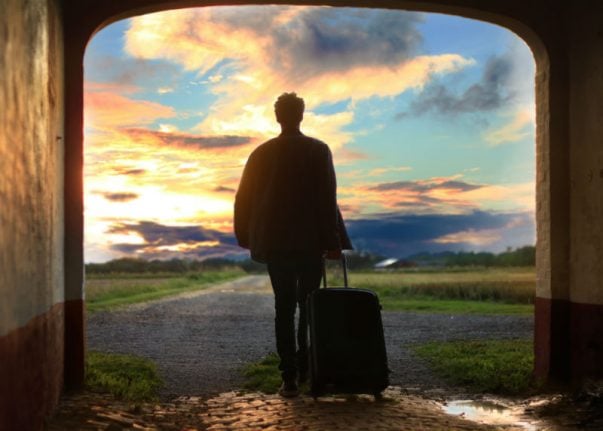One of the greatest challenges we faced when we moved to Galicia was leaving our families and close friends behind.
I think that those we love are never truly absent from us, the bond is eternal; but having said that, there is no substitute for the company of the ones we cherish.
Sometimes, an email or ‘phone call just doesn’t hit the spot. Leaving loved ones is as much a bereavement as when they leave us, and nothing can prepare you for that hollow feeling that engulfs you, when you are feeling a bit “ordinary”, and someone you wish was beside you, isn’t.
I’ve been a new kid on the block my whole life, since I was five, and we emigrated to Australia. I’ve lived on three continents, and went to eleven schools. I’m inclined towards introversion, but I like meeting interesting people. People up sticks and move to new countries, whether permanently or temporarily, are not really run-of-the-mill, and, on the upside, I have met some far-out characters on my travels.
Downside: I am also able to walk away from people fairly easily, and I often fail to see that the connection we made might be valuable to them. It’s a self-protective shield that I have carried for a long time. A few of the same old buddies have travelled with me in my emotional back-back through the years, and it certainly requires some effort to maintain these long-distance relationships.
The relatively modern luxuries of email, and social media make it seem pretty easy, and certainly, the frequency and means of contacting people has changed enormously in my lifetime. But nothing beats actually hanging out with your favourite crew.
When some of my family travelled from Sydney to western Australia, to work in the opal and iron ore mines, back in the 1960s, we would flock around their infrequent letters like gulls, reading and re-reading them to absorb the essence of the ones we missed so much.
A trip across the country to the west coast back then was not an option. We didn’t even have a telephone in our home, so a chat was also out of the question. Family who lived in the USA would also write to us, on wafer-thin airmail letters; and sometimes more bulky envelopes would arrive, containing photographs. These were treasured, and we longed for them.
Those cousins, whose awkward high school photos we cooed over so long ago, are grandparents now, and we share all of our family photos and videos on social media. ‘Phone apps enable us to speak face to face for free. But it is the rare visits that still thrill us all the most. A cousin whom I haven’t seen in 33 years is visiting Galicia in June. I pity our other halves!
One of my oldest friends visited in October last year. We sat by the fire sampling single malt whisky from the Scottish island he has retired to, listened to the world folk music that we both love, and has been our common bond since we met, and argued respectfully, from our polar political corners, exactly as we did nearly forty years ago.

Photo by Marcus Woodbridge on Unsplash
Back then, as hard-up students, we couldn’t afford single malt whisky, so we had to put the world to right drinking Bulgarian wine (I think it was wine. It said it was wine on the label) that melted our teeth and stained our lips black. The hangovers were vicious.
The conversation was mighty though. Back then, I posed in dungarees, berets and Breton fishermen’s shirts (my French literature and existentialism phase) while my friend sported a fungal-looking beard, the same colour as an orangutang’s armpit, and an “Atomkraft? Nein Danke” badge.
These days we’ll both wear anything with an elasticated waistband. My mate has finally shaved off his beard, because some kid in a department store last December asked him if he was Santa Claus. We are still the same people to each other.
We’ve been friends through work problems, divorces, health scares and the loss of parents. Which brings me to new friends, with whom I share no such history, but we do all share the experience of being new kids on the block later in life, and we share our humanity, with all its vulnerabilities, frailties and failings.
As ex-pats/migrants (delete as applicable), we might perceive the locals we meet as people who have never been “foreign.” We may see them as a people so steeped in their local tradition and family that they cannot be empathic to our experiences of migrant life.
And we would be wrong to do so. Galicia endured a massive diaspora; lost many of its sons and daughters to migration, some of whom are now coming home to villages their families have inhabited for hundreds of years.
I have met a few, who spent their adult lives in Argentina, Canada, Germany, or the USA, pursuing opportunities that were not available here in their home country.
Like many migrants, they made huge efforts and sacrifices to succeed, and they did well for themselves. They’ve carried back a wistfulness that I have seen before on the faces of emigres who return to a home that has changed in their absence.
I wonder if their occasional feelings of emotional detachment mirror mine? I also wonder if their sense of coming home is in any way different, because they were actually born here? I wonder what makes any of us connect spiritually to a place and want to call it Home?
Is that same mystical connecting thread present when we meet new acquaintances? I think as newbies, we audition many people until we form our band. It’s a bit like being back at school or university: you spend your second year trying to lose some of the friends you made in first year!
There are exceptions. I am still friends with some of the chicas I met at awkward Freshers’ Week cheese and wine receptions in our halls of residence. We are going to walk the Camino Invierno together next year, as a reunion.
My partner and I have different tastes in art, music, literature and people. Back in Australia, we had our own friends, as well as those in common or inherited from each other when we got together.
Here, we seem to be invited everywhere as a pair, so we are now sorting out whom we want to hang out with either collectively or individually. It is an interesting process.
We are also learning to say “no thanks” to some invitations to socialize, because sometimes we just get a bit “peopled out” with all the lunches and parties. But that is what some my more socially aware mates would call a “First World Problem.”
READ MORE:
- Follow the adventures of Heath in Galicia
- Lost in translation: The perils of being misunderstood in rural Spain
- OPINION: You will never feel at home in Spain if you languish in an expat ghetto
- Life in Spain: There's so much more to Spanish cuisine than paella (such as wild boar!)



 Please whitelist us to continue reading.
Please whitelist us to continue reading.
Member comments